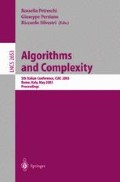Abstract
We study polynomial-time randomized algorithms that solve problems on “most” inputs with “small” error probability. The sets that have such algorithms are called nearly BPP sets, which naturally expand BPP sets. Notably, sparse sets and average BPP sets are typical examples of nearly BPP sets. It is, however, open whether all NP sets are nearly BPP. The nearly BPP sets can be captured by Nisan-Wigderson’s approximation scheme as well as viewed as a special case of promise BPP problems. Moreover, nearly BPP sets are precisely described in terms of Sipser’s distinguishing complexity. These sets have a connection to average-case complexity and cryptography. Nevertheless, unlike BPP, the class of nearly BPP sets is not closed even under honest polynomial-time one-one reductions. In this paper, we study a more general notion of nearly \( {\text{BP}}\left[ \mathcal{C} \right] \) sets, analogous to Schöning’s probabilistic class \( {\text{BP}}\left[ \mathcal{C} \right] \) for any complexity class \( \mathcal{C} \) . The “infinitely-often” version of nearly BPP sets shows a direct connection to cryptographic one-way partial functions.
Access this chapter
Tax calculation will be finalised at checkout
Purchases are for personal use only
Preview
Unable to display preview. Download preview PDF.
References
S. Aida and T. Tsukiji, P-comp versus P-samp questions on average polynomial domination. IEICE Trans. Inf. & Syst., E84-D (2001), 1402–1410.
L. Babai, L. Fortnow, N. Nisan, and A. Wigderson, BPP has subexponential time simulation unless EXPTIME has publishable proofs, Comput. Complexity, 3 (1993), 307–318.
H. Buhrman and L. Fortnow, One-sided versus two-sided error in probabilistic computation, Proc. 16th Symposium on Theoretical Aspects of Computer Science, Lecture Notes in Computer Science, Vol. 1563, pp. 100–109, 1999.
H. Buhrman, L. Fortnow, and S. Laplante, Resource-bounded Kolmogorov complexity revisited, SIAM J. Comput., 31 (2002), 887–905.
H. Buhrman and L. Torenvliet, Randomness is hard, SIAM J. Comput., 30 (2000), 1485–1501.
S. Even, A. Selman, and Y. Yacobi, The complexity of promise problems with applications to public-key cryptography, Inform. and Control, 61 (1984), 159–173.
S. Even and Y. Yacobi, Cryptocomplexity and NP-completeness, in Proc. 7th Colloquium on Automata, Languages and Programming, Lecture Notes in Computer Science, Vol. 85, pp. 195–207, 1980.
J. Feigenbaum and L. Fortnow, Random-self-reducibility of complete sets, SIAM J. Comput., 22 (1993), 994–1005.
J. Feigenbaum, S. Kannan, and N. Nisan, Lower bounds on random-self-reducibility, in Proc. 5th Structure in Complexity Theory Conference, pp. 100–109, 1990.
Y. Gurevich, Average case complexity, J. Comput. System Sci., 42 (1991), 346–398.
R. M. Karp and R. Lipton, Turing machines that take advice, L’enseigment Mathematique, 28 (1982), 191–209.
C. Lautemann, BPP and the polynomial hierarchy, Inform. Process. Lett., 17 (1983), 215–217.
L. A. Levin, Average case complete problems, SIAM J. Comput., 15 (1986), 285–286.
M. Li and P. Vitányi, An Introduction to Kolmogorov Complexity and Its Applications (second edition), Springer, 1997.
A. Meyer and L. Stockmeyer, The equivalence problem for regular expressions with squaring requires exponential space, in Proc. 13th Symposium on Switching and Automata, pp. 125–129, 1972.
N. Nisan and A. Wigderson, Hardness vs. randomness, J. Comput. System Sci., 49 (1994), 149–167.
C. Schindelhauer and A. Jakoby, The non-recursive power of erroneous computation, in Proc. 19th Conference on Foundations of Software Technology and Theoretical Computer Science, pp. 394–406, 1999.
U. Schöning, Probabilistic complexity classes and lowness, J. Comput. System Sci., 39 (1989), 84–100.
R. Schuler and T. Yamakami, Sets computable in polynomial time on average, in Proc. 1st International Computing and Combinatorics Conference, Lecture Notes in Computer Science, Vol. 959, pp. 400–409, 1995.
M. Sipser, A complexity theoretic approach to randomness, in Proc. 15th ACM Symposium on Theory of Computing, pp. 330–335, 1983.
T. Yamakami, Polynomial time samplable distributions, J. Complexity, 15 (1999), 557–574. A preliminary version appeared in Proc. 21th International Symposium on Mathematical Foundations of Computer Science, Lecture Notes in Computer Science, Vol. 1113, pp. 566–578, 1996.
T. Yamakami, Average Case Complexity Theory, Ph.D. dissertation, Department of Computer Science, University of Toronto, 1997. Available as Technical Report 307/97, University of Toronto. Also available at ECCC Thesis Listings.
D. Zuckerman, Randomness-optimal sampling, extractors, and constructive leader election, in Proc. 28th ACM Symposium on Theory of Computing, pp. 286–295, 1996.
Author information
Authors and Affiliations
Editor information
Editors and Affiliations
Rights and permissions
Copyright information
© 2003 Springer-Verlag Berlin Heidelberg
About this paper
Cite this paper
Yamakami, T. (2003). Nearly Bounded Error Probabilistic Sets. In: Petreschi, R., Persiano, G., Silvestri, R. (eds) Algorithms and Complexity. CIAC 2003. Lecture Notes in Computer Science, vol 2653. Springer, Berlin, Heidelberg. https://doi.org/10.1007/3-540-44849-7_26
Download citation
DOI: https://doi.org/10.1007/3-540-44849-7_26
Published:
Publisher Name: Springer, Berlin, Heidelberg
Print ISBN: 978-3-540-40176-6
Online ISBN: 978-3-540-44849-5
eBook Packages: Springer Book Archive

